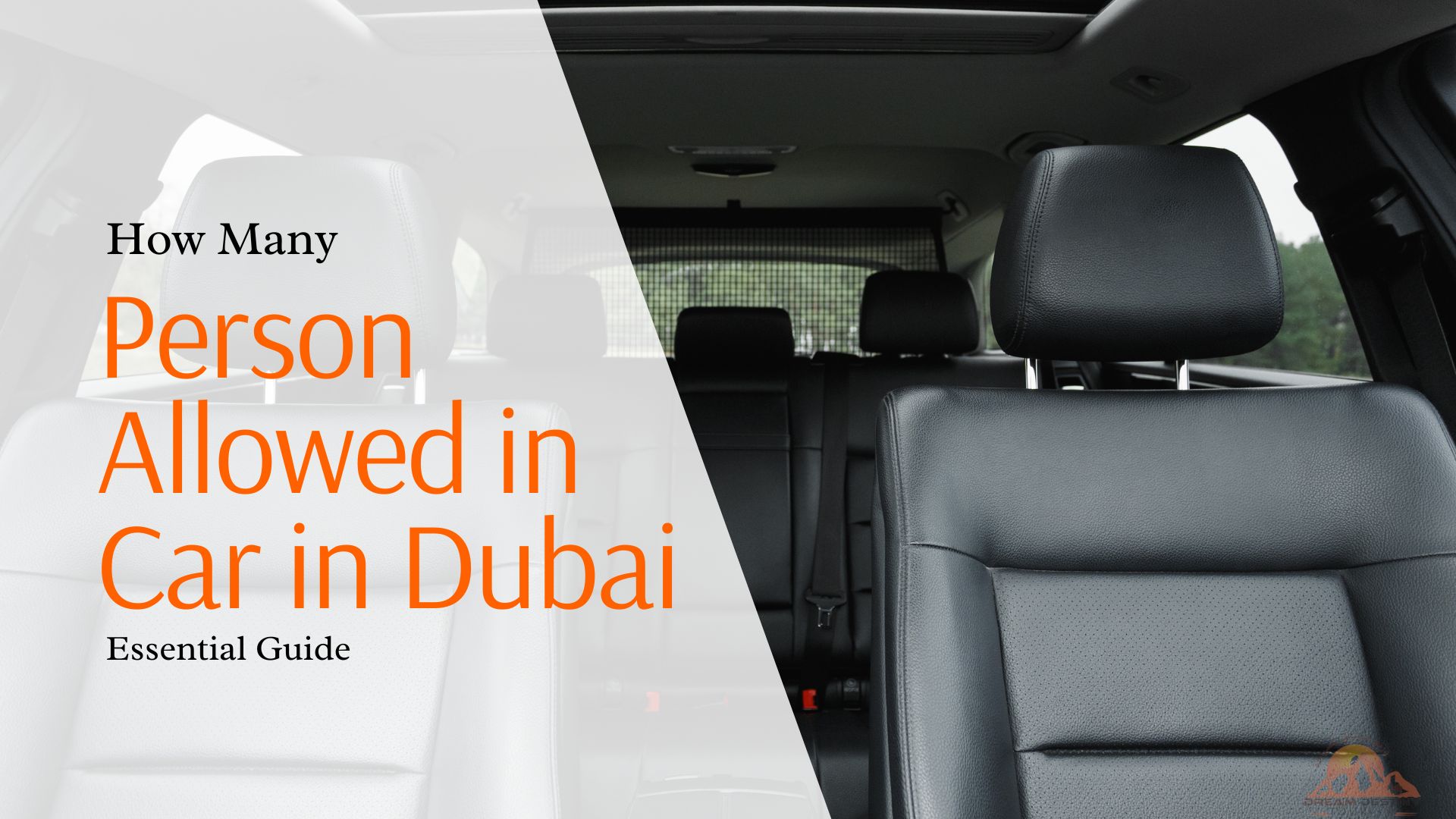In Dubai, a maximum of five persons are allowed in a car, including the driver. This rule ensures safety and compliance with traffic regulations.
Dubai, a bustling metropolis known for its luxury lifestyle and strict regulations, has specific rules for car occupancy. The limit of five persons per vehicle, including the driver, is enforced to maintain order and safety on the roads. This regulation helps reduce traffic congestion and promotes a safer driving environment.
Adhering to these rules is crucial for avoiding fines and ensuring a smooth driving experience. Dubai’s road traffic authorities are vigilant in monitoring and enforcing these regulations. Compliance with the car occupancy limit is a simple yet effective way to contribute to the city’s efficient traffic management system.
Legal Requirements
Driving in Dubai requires understanding and following specific legal requirements. Knowing how many persons are allowed in a car and the rules surrounding this can save you from fines and ensure safety. Let’s dive into the essential legal requirements.
Minimum Age Restrictions
The Roads and Transport Authority (RTA) in Dubai has set clear age restrictions for drivers and passengers. Drivers must be at least 18 years old to hold a driving license. For passengers, there are no strict age limits, but safety regulations must be followed.
Here’s a quick overview:
- Drivers: Minimum age of 18 years
- Passengers: No specific age restriction, but safety rules apply
Ensuring all passengers are properly secured is crucial. Young children should always be seated in the back and use appropriate child safety seats.
Seat Belt Regulations
Seat belt regulations in Dubai are stringent. Every passenger in the car must wear a seat belt. This rule applies to both front and back seats.
Failure to wear a seat belt can lead to fines and black points on your driving license. Here are the key points:
- Driver and front seat passenger: Must always wear seat belts
- Rear seat passengers: Required to wear seat belts
- Fines: AED 400 for not wearing a seat belt
- Black points: 4 points added to your license for violations
Always ensure that everyone in the car is buckled up before starting your journey.
Child Safety Seats
Dubai law mandates the use of child safety seats for young passengers. Children under the age of 4 must be in a child safety seat. This is non-negotiable for their safety.
Here’s a breakdown of the requirements:
- Children under 4 years old: Must be in a child safety seat
- Fines: AED 400 for not complying with child safety seat regulations
- Additional points: 4 black points on the driver’s license for violations
Ensuring proper installation of these seats is also vital. Refer to the manufacturer’s instructions for correct installation. This not only complies with the law but also ensures maximum safety for your child.
Private Vehicles
When driving a private vehicle in Dubai, it’s essential to know the rules about the number of passengers allowed. These rules ensure safety and compliance with local regulations. Knowing how many people can ride in your car can help you avoid fines and ensure a smooth journey.
Number Of Passengers
Dubai has specific rules regarding the number of passengers in private vehicles. The maximum number of passengers depends on the vehicle type and size. For standard cars, the following guidelines apply:
- Cars with 5 seats: Maximum of 5 passengers, including the driver.
- Cars with 7 seats: Maximum of 7 passengers, including the driver.
These rules ensure each passenger has a seat belt. Seat belts are mandatory for all passengers in Dubai. The authorities strictly enforce this rule to enhance road safety.
Furthermore, the front seat should only accommodate one passenger. This ensures the driver has enough space and visibility to operate the vehicle safely. Overcrowding can lead to fines and increased risk of accidents.
For families with children, child safety seats are mandatory. Children under 10 years old should not sit in the front seat. Ensuring child safety seats are used correctly is crucial for protecting young passengers.
Maximum Occupancy Limits
Understanding the maximum occupancy limits is crucial for safe and legal driving in Dubai. These limits are designed to prevent overcrowding and ensure all passengers can be safely restrained. The limits are based on the vehicle’s seating capacity:
| Vehicle Type | Seating Capacity | Maximum Occupancy |
|---|---|---|
| Standard Car | 5 seats | 5 people |
| SUV | 7 seats | 7 people |
| Minivan | 8-12 seats | 8-12 people |
Each passenger should have a designated seat with a seat belt. This applies to all vehicle types, ensuring maximum safety for everyone. Overloading a vehicle can lead to fines and increased accident risk.
For larger vehicles like minivans, the same rules apply. Each passenger must have a seat belt. Overloading with more people than seats is illegal and dangerous. Authorities conduct regular checks to enforce these rules.
Ensuring compliance with these limits helps maintain road safety and avoids legal issues. It also ensures a comfortable ride for all passengers. Always verify the seating capacity of your vehicle and adhere to the occupancy limits.
Public Transportation
Dubai is a bustling city with a vibrant lifestyle. It has strict rules regarding the number of people allowed in a car. Public transportation serves as a convenient alternative for those adhering to these regulations. In this section, we will explore the different modes of public transportation in Dubai.
Taxis
Dubai’s taxi service is one of the most efficient and popular modes of public transport. Taxis are a great option for those who prefer privacy and convenience. Here are some key points about Dubai taxis:
- Seating Capacity: Taxis in Dubai can typically accommodate up to 4 passengers.
- Safety Measures: All taxis are equipped with seat belts and follow strict safety protocols.
- Accessibility: Taxis can be hailed on the street or booked through apps like Careem and Uber.
- Payment Methods: You can pay by cash, credit card, or mobile payment options.
Dubai’s taxis are known for their cleanliness and courteous drivers. They are available 24/7, making them a reliable choice for any time of the day or night. For those traveling with more luggage, larger taxi options like vans are also available. These can carry up to 7 passengers, providing more space and comfort.
Buses
Dubai’s bus network is extensive and covers almost all parts of the city. Buses are an economical option for daily commutes and long-distance travel. Here are some essential details about Dubai buses:
- Seating Capacity: Buses can carry up to 50 passengers.
- Frequency: Buses run at regular intervals, usually every 15 to 30 minutes.
- Accessibility: Bus stops are conveniently located, and buses are wheelchair accessible.
- Payment Methods: Payments are made using the Nol card, which is a smart card used across all public transport in Dubai.
Dubai buses are equipped with air-conditioning, ensuring a comfortable journey even during hot weather. The buses also have dedicated seats for women and children, making them a family-friendly option. The bus routes are well-planned and cover both urban and suburban areas, making it easy to reach any destination within the city.
Metro
The Dubai Metro is one of the most advanced and efficient metro systems in the world. It is a fast and reliable mode of transport, especially for those looking to avoid traffic congestion. Key features of the Dubai Metro include:
- Seating Capacity: Each metro train can carry over 600 passengers.
- Frequency: Metro trains run every 5 to 7 minutes during peak hours.
- Accessibility: Metro stations are equipped with elevators and ramps, making them accessible for everyone.
- Payment Methods: The Nol card is used for metro travel, similar to buses and trams.
The Dubai Metro has two main lines, the Red Line and the Green Line, covering major areas of the city. The metro stations are modern and offer various amenities like free Wi-Fi, retail shops, and food outlets. The metro is an excellent choice for tourists as it connects to popular attractions like the Burj Khalifa, Dubai Mall, and Dubai Marina.
Special Circumstances
In Dubai, the number of people allowed in a car is generally restricted to the vehicle’s seating capacity. Yet, there are special circumstances that can alter these rules. Understanding these exceptions can help you stay compliant with local regulations and ensure everyone’s safety.
Emergency Situations
During emergency situations, the rules about how many people can be in a car in Dubai can change. Authorities may allow more flexibility. This is to ensure that people can be safely and quickly transported.
Important points to consider during emergencies:
- Medical Emergencies: If someone needs urgent medical attention, you can carry more passengers to get help faster.
- Natural Disasters: In cases of floods, storms, or other natural disasters, you may transport more people to safety.
- Law Enforcement: Police vehicles may carry more people when responding to emergencies.
For example, during a medical emergency, you might need to take a patient, a caregiver, and a family member to the hospital. In such cases, the authorities may allow more than the usual number of passengers.
Exemptions For Certain Vehicles
Some vehicles have exemptions from the usual passenger limits. These exemptions are mainly for vehicles designed for specific purposes.
Vehicles with exemptions include:
- Buses: Buses can carry many passengers as they are designed for public transport.
- Taxis: Taxis can carry a certain number of passengers, usually up to 4-5, depending on the vehicle type.
- Commercial Vehicles: Trucks and vans used for business purposes may have different rules.
For example, a bus designed for 50 passengers is allowed to carry that many. Similarly, a taxi can take up to its maximum seating capacity, usually 4-5 passengers.
Below is a table summarizing the exemptions:
| Vehicle Type | Passenger Limit |
|---|---|
| Bus | Up to seating capacity |
| Taxi | 4-5 passengers |
| Commercial Vehicle | Varies by vehicle type |
Understanding these exemptions ensures you follow the rules while making the best use of your vehicle.
Penalties For Violations
Driving in Dubai comes with its own set of rules and regulations. One crucial rule is about the number of people allowed in a car. Violating this rule can lead to serious consequences. Understanding the penalties for such violations is essential for all drivers to avoid hefty fines and other repercussions.
Fines
Dubai imposes strict fines for overcrowding in cars. These fines are part of the city’s efforts to ensure safety on the roads.
Key fines include:
- Overloading a vehicle: AED 400 fine.
- Exceeding the passenger limit: AED 200 fine.
- Failure to use seat belts: AED 400 fine per passenger.
These fines are designed to deter drivers from putting themselves and others at risk. It is important to adhere to the passenger limits to avoid these penalties.
Points System
Dubai uses a points system to track traffic violations. Accumulating too many points can lead to more severe consequences.
Key points for violations:
- Overloading a vehicle: 4 black points.
- Exceeding the passenger limit: 3 black points.
- Failure to use seat belts: 4 black points per passenger.
Accumulating 24 black points within a year can result in a license suspension. Drivers need to be cautious and follow the rules to avoid accumulating points.
Implications For Insurance
Violations can also impact your car insurance. Insurance companies take traffic violations seriously.
Key implications:
- Higher premiums: Traffic violations can lead to increased insurance premiums.
- Policy cancellation: Severe or repeated violations may result in policy cancellation.
- Claims issues: Violations can complicate claims processing and may lead to claim denials.
Maintaining a clean driving record is crucial for keeping insurance costs manageable. Avoiding violations helps ensure smooth insurance processes.
Frequently Asked Questions
How Many Passengers Are Allowed In A Car In Dubai?
In Dubai, a car can carry up to five passengers, including the driver. The number of passengers should match the vehicle’s seating capacity.
Is It Illegal To Have 6 Passengers In A 5 Passenger Car In Dubai?
Yes, it is illegal to have 6 passengers in a 5-passenger car in Dubai. Adhere to vehicle capacity limits.
How Many People Are Allowed In A Cab In Dubai?
In Dubai, a maximum of 4 passengers are allowed in a standard taxi. Larger taxis can accommodate up to 7 people.
How Many People Can Legally Fit In A Car?
The number of people legally allowed in a car depends on its seating capacity. Always refer to the vehicle’s manual. Generally, each seat must have a seatbelt.
Conclusion
Understanding car occupancy limits in Dubai is crucial for compliance and safety. Abide by the rules to avoid penalties. Always stay informed about the latest regulations for a hassle-free driving experience. Safe and legal driving ensures a smooth journey for all.
Stay aware, drive responsibly, and enjoy your time in Dubai.




